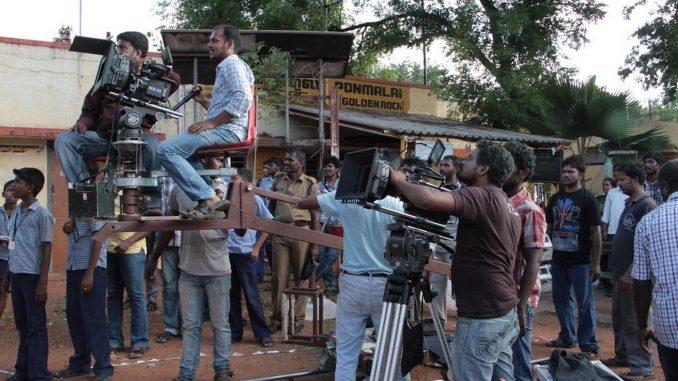Lakhs of Cine Workers in Distress as Kollywood Remains Shut Since March

Representational Image. Image Courtesy: Citizen Matters, Chennai
Chennai: Kollywood, as the Tamil film industry is known as, is at a crossroads now due to the pandemic. The second largest film industry in the country has never witnessed such a crisis in almost a century of its existence. Theatres and malls have been closed for over 100 days now while the restart of film shoots is unthinkable as of now, considering the spike in COVID-19 cases in Tamil Nadu, the second highest in number after Maharashtra.
The worst affected are the large section of workers involved in the film industry who are daily wage earners, and have been without any work since shootings halted on March 16, followed by the sudden countrywide lockdown that began from March 24.
The unplanned lockdown announced by the Union government and the ‘miserable failure’ of the state government in effective implementation of containment measures have added to the agony of these workers.
INDUSTRY WITH A GLOBAL REACH
The Tamil film industry is one of the largest in the country with an audience across the country and the globe. The industry has caught the attention of the global audience with frequent blockbusters, which accounted for over Rs 1,000 crore from theatrical releases in 2019 alone, when the industry saw the release of around 250 films in a single year.
The entertainment industry also contributes to the economy of the state government. In 2018-19, the industry contributed about 0.1% to state gross domestic product, estimated to be more than Rs 1,800 crore. It’s contribution to the state exchequer is set to take a hit owing to the lockdown.
While the pandemic-induced lockdown has brought the industry’s fast growth history to a standstill, it has left lakhs of workers without jobs and wages.
LAKHS OF WORKERS AFFECTED
The number of workers involved, directly and indirectly, in the Tamil film industry could be more than a few lakhs, including those who work in production, post production, distribution, theatres and publicity in the film and television industry.
Thousands of workers attached to cinema theatres – Tamil Nadu and Puducherry have a whopping 1,571 single screens – are also unemployed due to the lockdown. Considering a maximum of 10 workers employed in urban and rural areas, the number of workers affected could be around 15,000. The inclusion of workers in multiplexes will add another few thousand.
The associated industries, including suppliers to canteens in these theatres, have lost their livelihood. The life of these workers and their families has come to a virtual standstill.
ACTORS, UNIONS EXTEND LOCKDOWN RELIEF
The Film Employees Federation of South India (FEFSI) cancelled all film related work on March 16 as a precautionary measure. FEFSI, an umbrella organisation of 24 craft unions, has since been appealing for support to workers affiliated to the organisation. The 24 different unions under it, right from directors, editors, dubbing artistes, lightmen to mess and cleaning workers, have a membership ranging between 1,200 and 3,500.
A rough estimate of these numbers shows that the affected workers could be a minimum of 60,000. A large number of workers stay out of unions for various reasons, including their inability to pay membership fee in some unions.
Meanwhile, several top actors of the Tamil film industry and FEFSI have extended relief material to workers, saving them from starvation. The relief was distributed to members through the unions.
The cash relief from the government of Tamil Nadu to the industry, though minimal, has also been of some help. Even though post-production work restarted for a short while, it came to a halt after the lockdown in Chennai and surrounding districts.
NO FIXED INCOME FOR WORKERS
A large section of Kollywood workers are daily wagers, including junior artistes, workers involved in production and post-production, art, transport and catering services. Though wages differ from one department to another, their misery remains the same during the lockdown.
Arun, an assistant director, told NewsClick: “Lakhs of workers are dependent on the film industry for their living. Since no shooting is taking place for three months now, they are struggling a lot. The commendable gesture of star actors and the workers’ unions has helped to some extent.”
Even as these workers are being provided basic rations from the contributions, their requirements are far from being met. “The inability to pay house rent, medical expenses and other issues continue to torment them”, Arun added.
JOBS LOSS WILL HAUNT WORKERS
The lockdown within the unlock phase, with relaxations, is being extended till July 31, but the plight of these workers may remain the same. Even if production work resumes once the restrictions are relaxed for the industry, the day when each worker gets back his/her job remains a far cry.
Nissanth, a dubbing artiste, said: “All the workers may not get their work back after the restrictions are lifted. Producers will definitely try to reduce the production cost, leading to the loss of jobs. The post COVID-19 film industry would be totally different, with minimum stars and minimum workers.”
A film shooting generally requires 125 to 150 workers, and this number could be halved in the future. The plight of lightmen in the industry is also set to worsen.
Sampath, secretary of the Lightmen Union, said: “We get jobs between 12 and 18 days in a month with Rs 850 as wages. We are struggling now without any income and the future remains bleak. Many of our workers are on the verge of starvation. We have nowhere to go”. The union has around 1,300 members.
‘PRE-JANUARY SITUATION REQUIRED FOR NORMALCY’
The television industry, however, could start working soon as it relies largely on indoor shootings, but silver screen productions require more outdoor shoots, requiring total normalcy to be in place.
Babu, a production manager, said: “Restoration of normalcy looks distant, considering the present condition. Outdoor shootings are impossible to start now. Getting permission for the shoot and the co-operation of local people could be a difficult task. So, we would need normalcy that existed before the pandemic, for the industry to flourish”.
With production houses slowly shifting to digital platforms to release completed films, the industry is set to transform. This could again lead to massive job losses for lakhs of workers toiling behind the screen.
Get the latest reports & analysis with people's perspective on Protests, movements & deep analytical videos, discussions of the current affairs in your Telegram app. Subscribe to NewsClick's Telegram channel & get Real-Time updates on stories, as they get published on our website.
























